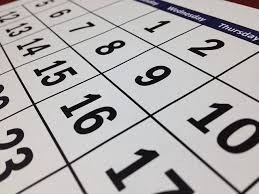Only ONE more day to subscribe and enter to win a fantastic writing book for all ages! Enter your email address in the subscription box now, and don’t forget to confirm through your email afterward, or you won’t be registered!
 Forget New Year’s Day; like all teachers and parents, the beginning of September is the start of my new year, and summer into fall is my biggest transition. I’ve spent a lot of time on my writing career both while teaching full-time, and while being on leave or summer vacation. I often wonder if I’m more productive with or without the structure of the school day. Some of you may be wondering the same thing: Do I quit or downsize my job so I can focus full-time on writing? Or does my job provide a structure to hang my writing habits on? With only myself to be accountable to, do I do more, or less?
Forget New Year’s Day; like all teachers and parents, the beginning of September is the start of my new year, and summer into fall is my biggest transition. I’ve spent a lot of time on my writing career both while teaching full-time, and while being on leave or summer vacation. I often wonder if I’m more productive with or without the structure of the school day. Some of you may be wondering the same thing: Do I quit or downsize my job so I can focus full-time on writing? Or does my job provide a structure to hang my writing habits on? With only myself to be accountable to, do I do more, or less?
I decided to look at my writing schedule for summer and fall, to see how I’m doing before and after the transition back to school. It would be hard to track via the actual work I produce, because that can vary based on the stages of my main work-in-progress and side projects. But I can track the time I spend focused on writing.
Note: I am not including time spent brainstorming, staring into space, and making notes via voice memos on my phone. These are all significant parts of my writing process, but hard to quantify in terms of time.
My summer writing schedule:
- Woke up around 6:00, write until Edwin woke up (or a little past; he’s good about playing alone in bed): about 30 minutes of work.
- Took a few minutes every hour or so to take care of small tasks, such as promoting blog posts and reading writing articles on my blog feed: about 20 minutes of work.
- Wrote during Edwin’s nap, as long as we weren’t traveling: about an hour and 15 minutes of work.
- In the evenings, sometimes I wrote more, and sometimes I used the extra time to read (which is writing-related, in a looser way): an average of 30 minutes of work.
This is a typical at-home schedule, but it’s not representative of the entire summer. In the lead-up to finishing my novel and the Writer’s Digest Conference, I wrote more; during some vacations, I stuck to my usual schedule, and during others I didn’t write much at all. One thing I am proud of: even if I didn’t write on a vacation, I got right back into the schedule without hesitation the day afterward. I guess I really love my work!
Weekly total: Since I can’t account for all variations in schedule, I’m going to calculate based on my usual, about 2 and a half hours per day of sit-down writing work. That’s 17.5 hours per week.
My fall writing schedule:
- Wake up at 5:20, write from 5:30-6:05: about 35 minutes of work.
- Just before I leave for work, take care of small tasks, such as promoting blog posts and reading writing articles on my blog feed: about 15 minutes of work.
- Write during part of my lunch break: 30 minutes of work. (Sacrifice: I eat lunch fast, and alone. But that gives me enough time to rest my mind.)
- In the evenings, I write if I still feel fresh and if something is pressing. But my brain is usually exhausted by 8PM, and sometimes before. It varies, but I’d say I only get about 20 minutes before bed.
- On the weekends, I can work more; both days are similar to my summer schedule as long as I’m home during Edwin’s nap time.
Weekly total: I’m getting about an hour and 45 minutes per workday, which increases to 2 or 2 and a half on weekend days. That’s about 13.5 hours a week. Not bad; it’s a part-time job, on top of my full-time job. Since it would be hard for me to squeeze more time unless I woke up even earlier or worked more on weekends (both possible, if needed), I think my daily fall schedule is as good as it can be right now.
For some writers, 13-17 hours a week isn’t much. But I make sure that I’m completely mindful during those times and 100% focused on writing, so there’s no time wasted; and more to the point, I feel like I’m giving the most time I can on a daily basis, with a full-time job and a family. At a later stage in my life, I’m sure my measly 17 hours will seem laughable!
It was a great exercise for me to work this out; I encourage others to do the same. I may even take it a step further and track my time for a week or two. This is something I did a few years ago after reading Laura Vanderkam’s book 168 Hours (still a favorite, life-changing book for me). It’s astonishing how much time-tracking reveals about time wasted, time spent, and how well your priorities are being lived out. If I do that, I’ll post it here, and if anyone else would like to join me, I’d love to discuss what we both learned from the exercise.
You can time-track with apps like Toggl, or a simple spreadsheet, or subscribe to LV’s website for her version.
Have you ever tracked your time, even loosely? Why did you do it? What did you learn?

I feel the same way about Sept. being the start of my new year–I always reevaluate at this time of year. Funny you should mention time tracking. I just completed tracking for a week, and still need to evaluate it using Laura’s questions: What do I like most about my schedule, What do I want to do more of with my time? and What do I want to spend less time doing? I might look at that tonight and tomorrow and write a blog post about it–thanks for the idea! Laura’s book was eye-opening for sure.
My writing goal right now is 20 hours a week, which should be quite easy given my other responsibilities–no children requiring my care and no full-time job. I find that I let my household responsibilities creep into my writing time, and that I am too tired at night to get much done. We do have an elderly dog who needs some extra care and attention, but that’s more of a distraction than a time suck. I’m still experimenting with ways to use my energy better. I also find that I fritter my time away doing less than important things. All stuff to work on.
Kathy, let me know when you write the post and I’ll link to it! I find time studies fascinating. It’s so important to see whether your daily activities are actually living up to your priorities.
I agree that energy use is an important factor as well. I’ve always wished that L.V. would allude to energy more in her books. All times of day are not created equal.
I just put up the post on time tracking: http://www.catchinghappiness.com/2015/09/how-keeping-time-log-boosted-my.html. Thanks for the inspiration! Have a happy weekend.